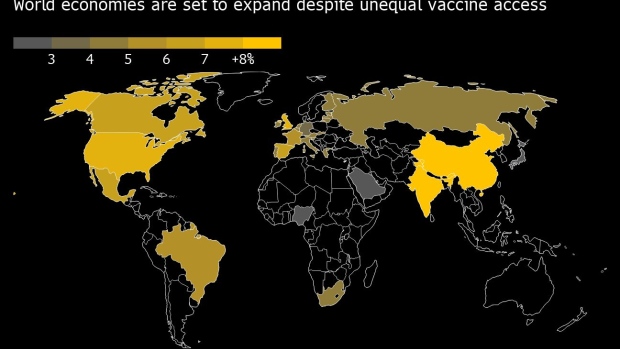Jul 28, 2021
World Economy at Key Juncture Amid Vaccine Gap, IMF Chief Warns
, Bloomberg News

(Bloomberg) -- The world economy is at a dangerous juncture as the gap widens between nations that have access to Covid-19 vaccines and those that don’t, according to the International Monetary Fund’s managing director.
Navigating the recovery from here will require careful choices by policy makers, especially central banks, Kristalina Georgieva warned.
“How will they calibrate the withdrawal of stimulus when models and data are not applicable and uncertainty remains extreme, when the extent of scarring is still unknown, and markets’ willingness to finance high public and corporate debt levels could change rapidly? What should be their guiding principles to navigate our exit?” Georgieva said in Washington, D.C., according to prepared remarks.
Georgieva asked how central banks will adapt their tool kits to the post-pandemic policy landscape and how they’ll prepare for an acceleration in digital money.
“These are just some of the difficult questions being faced by central bankers everywhere,” she said.
The remarks come a day after the IMF warned that unequal access to vaccines is further widening the recovery gap between advanced and developing economies. The fund maintained its outlook for the biggest rebound in global economic growth in four decades, but changed its underlying regional forecasts.
World output is still expected to grow 6% in 2021 following last year’s 3.2% drop, the fund said in an updated World Economic Outlook released Tuesday. It reduced the emerging-market forecast to 6.3% expansion, compared to the 6.7% increase projected in April, and raised the estimate for advanced economies by 0.5 percentage point to 5.6%.
“Many emerging and developing economies are projected to grow slower than we had anticipated,” Georgieva said. “This difference is primarily due to dramatic differences in vaccine availability — thus, infection rates — and availability of fiscal space to act.”
©2021 Bloomberg L.P.





